Best Crypto Exchanges in Bangladesh
.webp)
Summary: Bangladesh maintains one of the strictest positions on cryptocurrency in South Asia. While this means there are no locally licensed platforms offering Bangladeshi Taka (BDT) deposits, many residents still access international crypto exchanges that comply with global standards.
Here are the leading crypto exchanges for Bangladeshi investors:
Bybit is the best cryptocurrency exchange for Bangladeshi investors thanks to its instant and free BDT deposits to trade and stake cryptocurrencies with low investment fees from 0.1%.
Available Markets
2,100+ Cryptocurrencies
Security
Globally regulated with audited 1:1 reserves
BDT Deposit Methods
Bank Transfer, Nagad, bKash & Credit Card
Top Crypto Trading Platforms in Bangladesh
Bangladesh maintains strict restrictions on cryptocurrency, yet demand continues through global platforms that accept BDT deposits or peer-to-peer transfers. The table below outlines the leading international crypto exchanges for Bangladeshi traders, comparing costs, features, Bangladeshi Taka (BDT) deposit methods, and supported cryptocurrencies.
1. Bybit
Bybit is the best global crypto exchange in Bangladesh, boasting over 76 million users across 200 countries and daily volumes exceeding $27 billion. It offers a wide mix of spot, perpetual futures, and options contracts alongside innovative competitions like the World Series of Trading (WSOT).
The platform lists 2,100+ cryptocurrencies, and traders have access to leveraged futures (up to 200×), Copy Trading, and a suite of automated Trading Bots such as Grid, Martingale, and DCA strategies. There is also Bybit Earn, which provides flexible and fixed savings products and liquidity mining.
Its non-custodial wallet allows users to interact with DeFi applications, store NFTs, and connect to dApps, while the Bybit Card offers up to 10% cashback and VIP perks. Additional services include crypto loans, institutional trading support, and AI-powered market insights through TradeGPT.
Platform Highlights:
- Fees: Spot trading starts at 0.1%.
- Supported Assets: 2,100+ cryptocurrencies.
- Regulation & Licensing: Licensed in Dubai; adheres to global AML/KYC requirements.
- BDT Deposit Methods: P2P trading only (Bank transfer, bKash, Rocket, Nagad, AirTM, UPI).
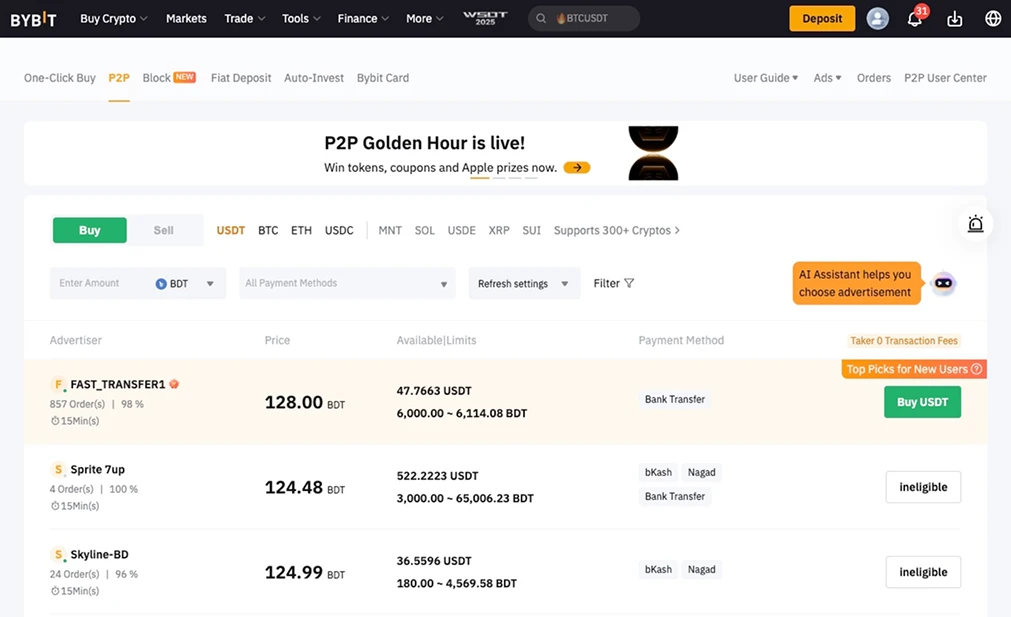
2. Gate
Gate, founded in 2013, has built a reputation as one of the world’s most comprehensive exchanges because of its enormous range of 3,600+ listed cryptocurrencies. With daily volumes often topping $28 billion, it consistently ranks among the largest global crypto investment platforms.
The platform provides spot trading, futures with up to 100× leverage, margin lending, and structured products under its “Simple Earn” program. Gate also operates a Launchpad that gives early access to new token sales, and the native GateToken (GT) is used for trading discounts.
Security is another strength, with a 123.98% reserve ratio reported through proof-of-reserves audits, ensuring full backing of customer assets. It is designed for accessibility, offering quick buy options, copy trading, and a mobile app available in multiple languages, including English and Bengali.
Platform Highlights:
- Fees: Spot trading from 0.2%, reduced with GateToken (GT).
- Supported Assets: 3,600+ cryptocurrencies.
- Regulation & Licensing: Licensed globally and accessible to Bangladeshi investors.
- BDT Deposit Methods: Debit card, credit card, Google Pay.
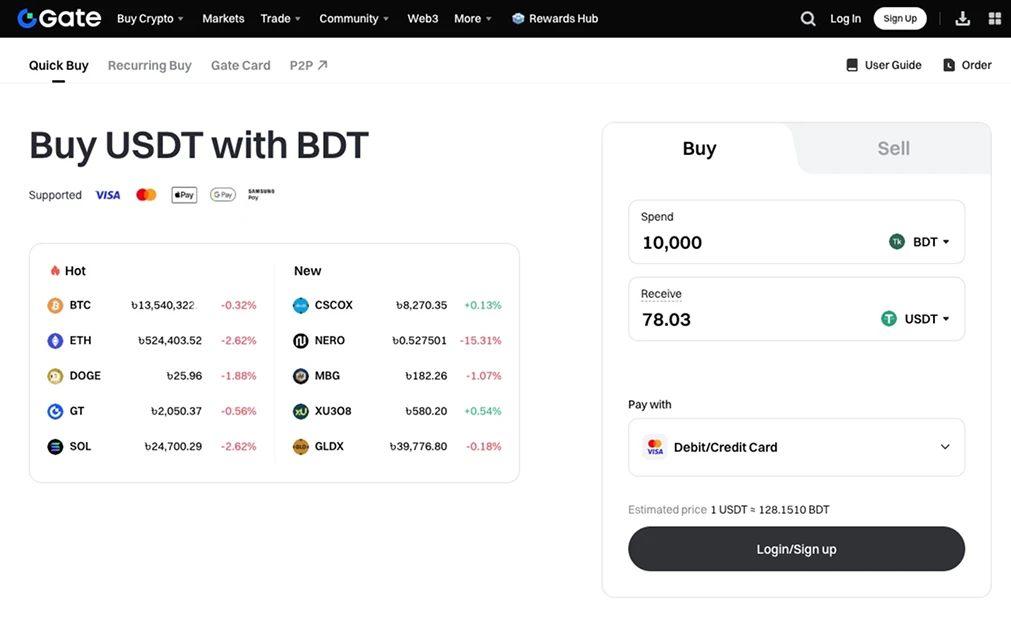
3. KuCoin
KuCoin, launched in 2017, has become one of the most widely used crypto exchanges in the world. Known as the “People’s Exchange,” it is especially popular with Bangladeshi traders thanks to its low entry barrier, allowing users to start trading with as little as $1, and wide product coverage.
The platform supports 900+ cryptocurrencies, including leading altcoins, stablecoins, and exclusive early listings through its GemSPACE hub. KuCoin provides margin trading, futures, ETFs, and leveraged tokens with 100x leverage for traders seeking more advanced strategies.
One of KuCoin’s biggest draws is its yield-earning ecosystem. KuCoin Earn offers flexible and fixed savings, crypto lending and borrowing, and promotional staking rewards, with some tokens generating APYs as high as 350%. There are also grid, DCA, and futures trading bots available.
Platform Highlights:
- Fees: 0.1% spot fees, reduced when paying with the KCS token.
- Supported Assets: 900+ cryptocurrencies.
- Regulation & Licensing: Registered in Seychelles and available in Bangladesh.
- BDT Deposit Methods: Debit card, credit card.
%201.webp)
4. Binance
Binance, founded in 2017, is the largest crypto exchange in the world with over 287 million registered users across 180+ countries. For Bangladeshi traders, it stands out as the most liquid exchange, offering fast execution and deep order books across spot, futures, and options markets.
Its scale also makes it a preferred choice for institutions, thanks to high-frequency APIs, OTC trading desks, and tailored custodial solutions through Binance Custody. The platform lists 350+ coins, covering leading assets as well as new projects through Launchpool, Airdrops, and Megadrops.
The platform offers a wide range of services: Binance Earn for staking and fixed income products, an NFT marketplace for buying and selling digital collectibles, and Auto-Invest for dollar-cost averaging strategies. Its P2P marketplace supports global fiat currencies, including BDT.
Platform Highlights:
- Fees: 0.1% spot trading; lower with BNB token payments.
- Supported Assets: 350+ cryptocurrencies.
- Regulation & Licensing: Licensed in Dubai, France, Italy, and other global hubs.
- BDT Deposit Methods: Debit card, credit card.

5. OKX
OKX combines a full-featured centralized exchange with powerful Web3 services, providing Bangladeshi traders with a single platform to buy, trade, earn, and self-custody. Founded in 2017, it supports card purchases, fast convert with zero trading fees, and 100+ payment methods.
On the trading side, you get spot, margin, perpetual, and expiry futures, plus options; pros can tap deep liquidity for futures spreads, custom multi-leg strategies, and low-latency APIs. OKX Trading Bots run around the clock, supported by a Bot Marketplace and Signal Marketplace.
Its OKX Wallet is a non-custodial gateway to DeFi, NFTs, and swaps across 130+ native chains. You can store assets, stake for on-chain yields, analyze liquidity and flow with a real-time terminal, access thousands of DeFi apps, and discover new tokens with built-in discovery tools.
Platform Highlights:
- Fees: Spot trading from ~0.08% maker/taker.
- Supported Assets: 350+ cryptocurrencies.
- Regulation & Licensing: Licensed in multiple jurisdictions and accessible from Bangladesh.
- BDT Deposit Methods: P2P trading only.
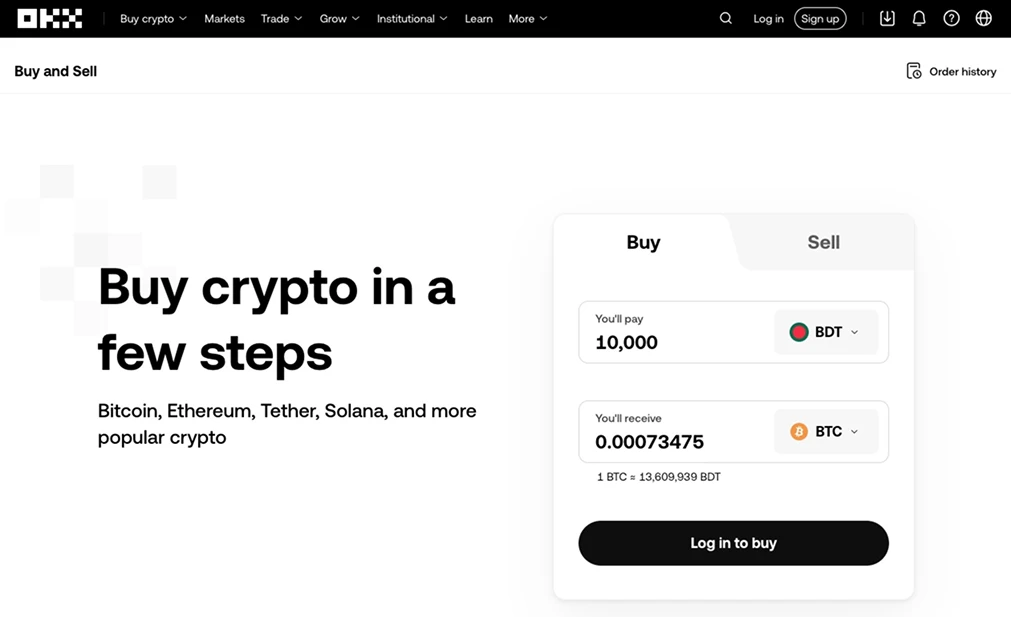
6. Bitget
Bitget is a great option for Bangladeshi traders who want spot, futures, and automated strategies in one place. Founded in 2018, the exchange supports 800+ assets, runs on TradingView charting across web, desktop, and mobile, and pushes frequent promotions and competitions.
Its social trading stack is the hook: curated leaderboards, futures copy trading, and bot copy trading let newcomers mirror strategies while keeping position controls and risk limits. Security is anchored by a $719M Protection Fund, cold-storage with multi-sig, and a Proof-of-Reserves program.
Beyond core markets, Bitget’s Earn hub offers flexible savings and promotional yields, while Launchpool and an airdrop library surface early-stage tokens. The exchange runs both spot and derivatives with deep liquidity in majors and maintains round-the-clock support plus extensive help docs.
Platform Highlights:
- Fees: Spot trading starts at 0.1%.
- Supported Assets: 800+ cryptocurrencies.
- Regulation & Licensing: Regulated globally and available in Bangladesh.
- BDT Deposit Methods: Credit card, debit card and multiple P2P options (Rocket, Perfect Money, UPI, Air TM, bKash, Nagad, Payall).
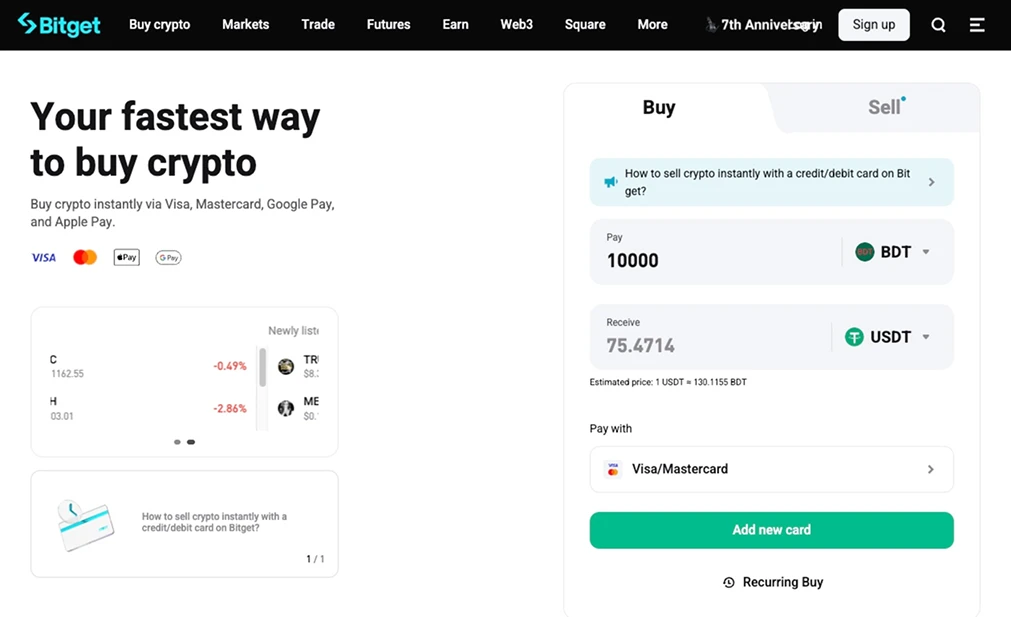
Is Crypto Regulated in Bangladesh?
Bangladesh takes a notably stringent position on cryptocurrency. The central authority, Bangladesh Bank, has reinforced this stance through multiple public notices explicitly warning banks, financial institutions, and the public against dealing in virtual currencies, which are not recognized as legal tender.
Enforcement is shaped by several entities: the central bank oversees general policy, the Financial Intelligence Unit (BFIU) monitors potential illicit activities, the Ministry of Finance guides future direction, and the CID investigates suspected violations.
While blockchain technology has been embraced in areas such as governance through a National Blockchain Strategy launched in 2020, cryptocurrency itself remains restricted, with no licensed exchanges, tax guidelines, or formal sandbox available. In practice, this regulatory void has driven crypto activity underground via peer-to-peer trading.
How is Crypto Taxed in Bangladesh?
Bangladesh does not currently have a defined tax framework for cryptocurrency, as digital assets are treated as illegal under existing financial laws. Since trading and holding crypto are prohibited, the National Board of Revenue (NBR) has not issued any tax guidelines on capital gains, income, or VAT for digital assets.
This means individuals engaged in crypto trading operate in a legal gray area, facing potential penalties rather than taxation. By contrast, blockchain technology is recognized for non-financial uses, but until regulations change, cryptocurrency remains outside the country’s formal tax structure.
How to Buy Bitcoin in Bangladesh
For residents in Bangladesh, purchasing Bitcoin requires using international platforms, as no domestic exchanges are licensed to operate under local law. Many global exchanges, however, provide safe and compliant access through peer-to-peer trading, card payments, or stablecoin transfers. Here’s a simple guide to getting started with BTC in Bangladesh:
- Select a Crypto Exchange: Choose a reputable global platform that accepts Bangladeshi users and offers BDT funding options through peer-to-peer networks or supported international payment methods.
- Create Your Account: Sign up and complete Know Your Customer (KYC) verification, which usually involves uploading a valid passport or national ID and proof of residence such as a utility bill or bank statement.
- Deposit Funds: Add money to your account using available options. For Bangladesh, this typically includes peer-to-peer bank transfers, international debit or credit cards, or stablecoin deposits.
- Purchase Bitcoin (BTC): Once your account is funded, navigate to the Bitcoin section on the platform, enter the amount you want to buy, confirm the details, and finalize the trade.
By following these steps, investors in Bangladesh can securely access Bitcoin through leading exchanges that offer strong account protection and transparent trading conditions.
Final Thoughts
For Bangladeshi investors, the safest path to crypto exposure lies in using established international exchanges that provide strong security, proof of reserves, and reliable peer-to-peer funding options.
While domestic regulations remain restrictive, global platforms such as Bybit, Gate, KuCoin, Binance, OKX, and Bitget give residents access to digital assets with transparency and oversight.
Frequently asked questions
Can Bangladeshi businesses legally accept cryptocurrency as payment?
No, accepting crypto payments is not legally recognized in Bangladesh. Business use of cryptocurrencies is explicitly discouraged by the central bank, with enforcement likely under general foreign exchange and money laundering laws.
Which payment methods are most common for funding crypto accounts in Bangladesh?
Most Bangladeshi traders rely on peer-to-peer bank transfers, mobile wallets like bKash and Nagad, international debit or credit cards, and stablecoin swaps to fund accounts on global exchanges.
Are peer-to-peer crypto transactions safe in Bangladesh?
P2P transactions can be safe when done on reputable exchanges that provide escrow and user protection. However, using informal networks outside trusted platforms carries higher risks of fraud and disputes.
Do crypto mining and staking carry legal risks in Bangladesh?
Yes. While there’s no explicit ban on mining or staking, these activities operate in a legal gray zone. The government applies broad financial regulations, and the undeclared status of crypto-related activities means engaging in them carries potential legal consequences.
%25201%2520(1).webp)
Written by
Emily Shin
Research Analyst
Emily is passionate about Web 3 and has dedicated her writing to exploring decentralized finance, NFTs, GameFi, and the broader crypto culture. She excels at breaking down the complexities of these cutting-edge technologies, providing readers with clear and insightful explanations of their transformative power.

.webp)
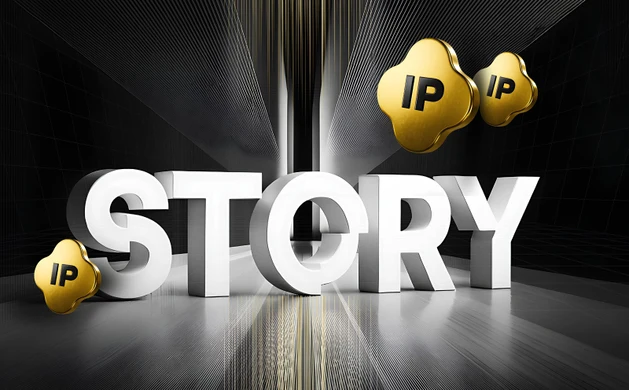
%2520(1).webp)
.webp)
%2520(1).webp)




